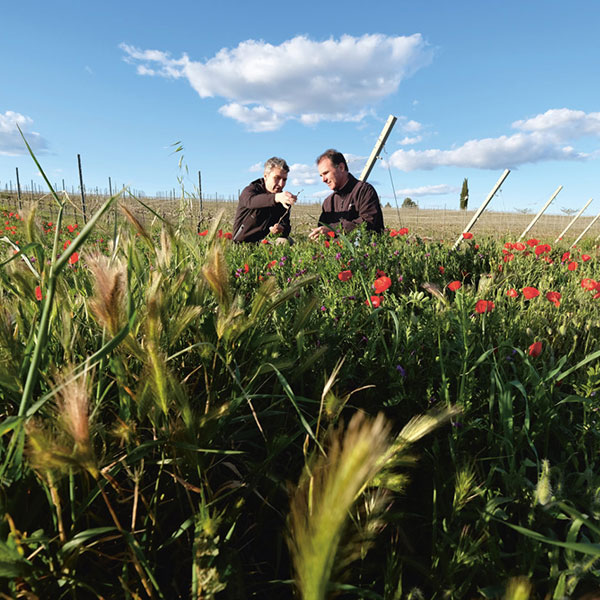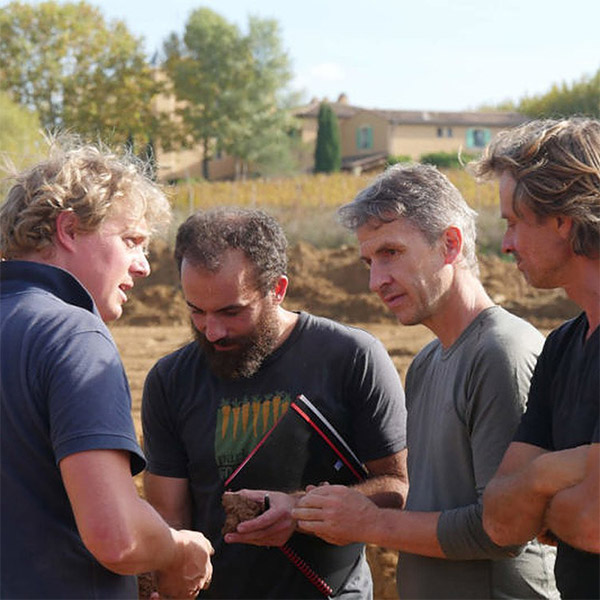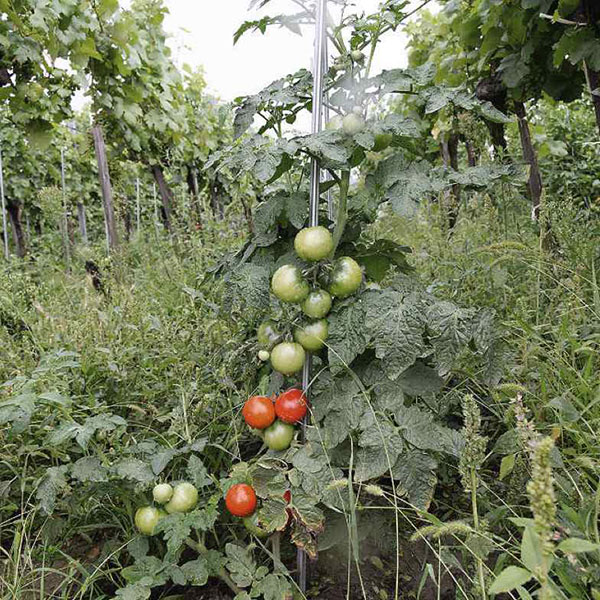"The wars of the future will be fought over water," predicted former UN Secretary-General Boutros Ghali as early as 1985. Climate change and the growing world population are now bringing this scenario closer. The hot and dry summers from 2018 to 2020 have also caused groundwater levels to drop in some regions of Germany, threatening ecosystems, drinking water supplies and viticulture. But there are strategies to counteract the impending "desertification" of dry regions. One concept that is particularly promising in vineyards is permaculture.
It is a wine merchant who is pioneering this in the vineyard: Already 40 years ago, Karl Schefer, founder of the Swiss mail-order company Delinat, defined his own guidelines for the production of wines for his winegrowers. Even then, they went far beyond the rules of organic viticulture. From the beginning, the focus was on biodiversity, cover crop and soil cultivation In Focus. "For five years now, we have been explicitly dealing with the topic of permaculture," says Daniel Wyss. The farmer and landscape architect has been involved in organic farming for over 30 years. He advises the 100 Delinat winegrowers from Germany, Spain, Italy, France and Switzerland on the application of the guidelines. They include the German VDP wineries Battenfeld-Spanier (Rheinhessen) and Ökonomierat Rebholz (Pfalz).
Delinat has been running its own winery since 1991. With the help of customers who participated as shareholders, the mail-order company bought a neglected estate with vineyards in Provence. Today, Château Duvivier is considered a model farm, where Daniel Wyss tests with the winemakers on site what will later be introduced in the member wineries. "We did a lot of research on cover crop, tree planting and copper alternatives," he says of the beginnings. Since 2018, however, the water supply has been a problem In Focus: "We have increasing problems with this, and it affects the fertility of the vines and the yields," Daniel Wyss describes the situation.
 |
|---|
The key to improvement for him is permaculture. For the pilot project at Château Duvivier, the Delinat experts are working with pioneers Josef Holzer and Jens Kalkhof. The two of them brought the concept of permanent and near-natural agriculture, developed by the Australian Bill Mollison in the 1970s, to use in Europe as "Holzer's permaculture". "Together we have transformed the farm so that every drop of water that falls on the vineyard can also seep into the vineyard," is how Daniel Wyss sums up the goal.
Derived from "permanent culture", Bill Mollison has defined the term thus: "Permaculture is the deliberate design as well as maintenance of agriculturally productive ecosystems that have the diversity, stability and resilience of natural ecosystems." In other words, it is about creating self-sustaining recirculating systems that are as close as possible to a naturally occurring eco-system.
In order to secure the water supply for the vines and at the same time do without irrigation, Daniel Wyss wants to allow as much rainwater as possible to seep into the soil and prevent run-off. The topography at Château Duvivier, with slightly sloping vineyards, helps him to do this: "We have built many small ponds that hold between 50 and 80 cubic metres of water." Above the vineyards there is also a lake with 3,000 cubic metres, plus many channels that direct the water to where it is needed. This way, the rainwater is collected and can slowly seep away. "Projects in Portugal have shown that you can revive completely withered landscapes in this way," he refers to the Herdade dos Lagos vineyard in the Vale de Camelos in Portugal's Alentejo. "Only if we co-supply the groundwater flow with rainwater and keep it stable, can it survive very dry periods and thus secure the water supply."
 |
|---|
In the Alentejo, the team led by Antje and Thorsten Kreikenbaum has created large lakes over the past decades, which collect the average rainfall of a maximum of 600 mm per year and make it available for irrigation during the hot and dry summer months. For this purpose, more than 600 hectares of forest were afforested. In the meantime, the landscape is characterised by lush greenery and provides wintering grounds for cranes. High-quality viticulture and other agricultural production have long flourished there again.
But water retention alone is not enough to maintain the fertility of the vineyards - only loose soils can absorb water. "For this, the right cover crop and humus formation are absolutely necessary," explains Daniel Wyss. Until now, the doctrine has been to work the soil by ploughing and deep loosening, thereby promoting soil fermentation. Permaculture experts have come a long way from that. Now the soils are only tilled shallowly, cover crop rolled instead of turned over and loosened at most with a disc in depth. This preserves the soil cultures. Depending on the conditions on site, the Delinat winegrowers work with respectively adapted seed mixtures for cover crop the vine rows.
This creates the basis for another aspect of permaculture in the vineyard: Vitiforest. With this approach, trees and bushes are integrated into the monoculture. "Understandably, the winegrowers are reluctant at first, because trees in the vineyards make mechanical cultivation impossible," says Daniel Wyss. He works with the winegrowers on concepts that combine both. For example, they plant trees around the vineyards. After all, it used to be common practice to let vineyard peaches or other fruit trees grow in the immediate vicinity of the vineyards.
 |
|---|
The goal is to increase the number of trees per hectare to up to 40 with a three-stage system. For Daniel Wyss, the advantages are obvious: "Planted in the right place, trees have a positive effect on the vines," he explains. Trees and hedges help water to seep into the soil and make water available from deeper soil layers in dry periods. But not every tree species is suitable: "We recommend medium-sized trees and especially those that benefit from the same mycorrhiza." This connection between fungi and roots ensures that the plant is supplied with the most important nutrients. Certain trees also take on a "nurse" function for the vines. "We have observed that vines planted in the immediate vicinity of Speierling or quince trees have grown significantly better than those planted further away," reports the winemaker consultant. "Trees and vines have a natural connection," he is convinced. After all, wild vines use the trees as a climbing aid. "Interestingly, the vine seems to remember this genetic origin."
The complexity of cultivation as permaculture initially demands a lot of willingness from the winegrowers to engage with new ideas and methods, as well as to accept yield losses at times. "But the positive effect of the concept contributes to more resistance of the vines to diseases and drought stress," Daniel Wyss is convinced. "We clearly see that permaculture makes the vines stronger."
Kristine Bäder works as a freelance journalist and author. She was editor-in-chief of the wine magazine FINE until January 2021 and previously editor-in-chief of Sommelier Magazine.